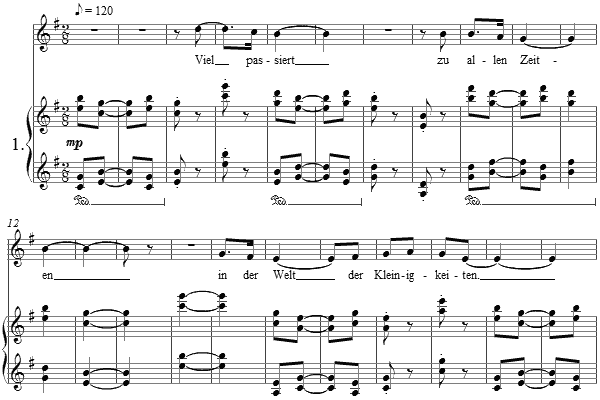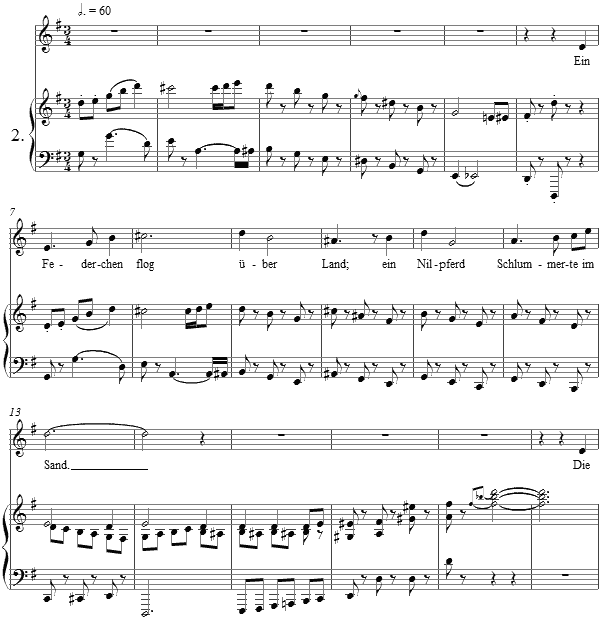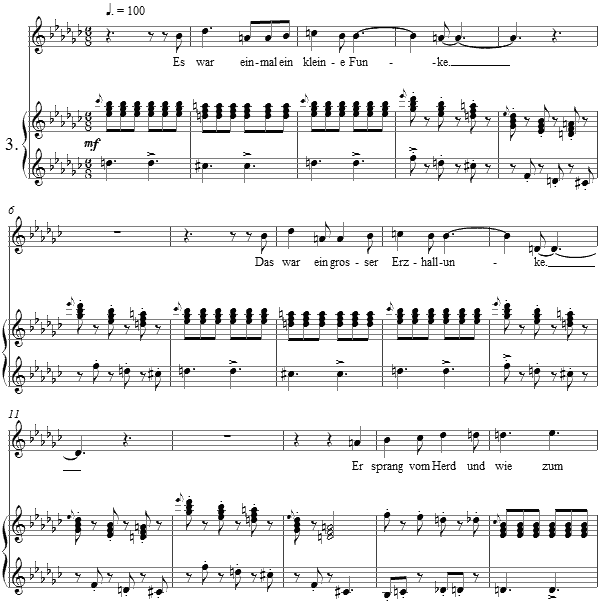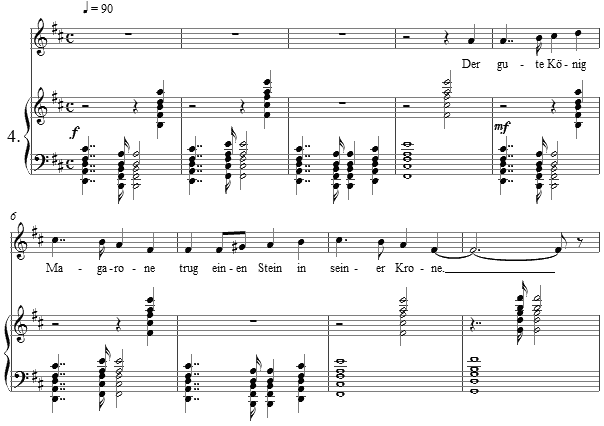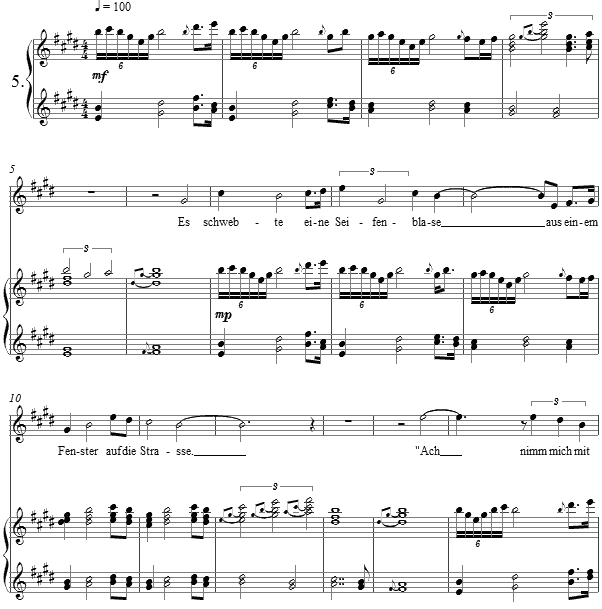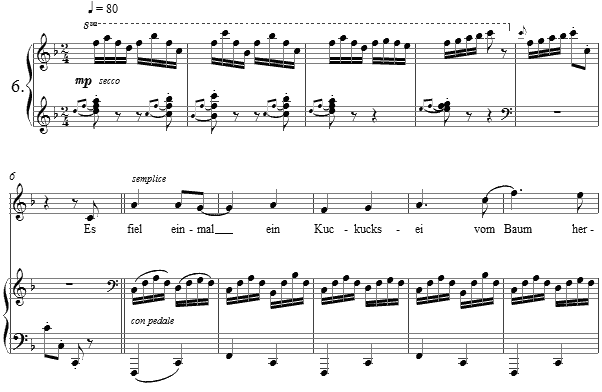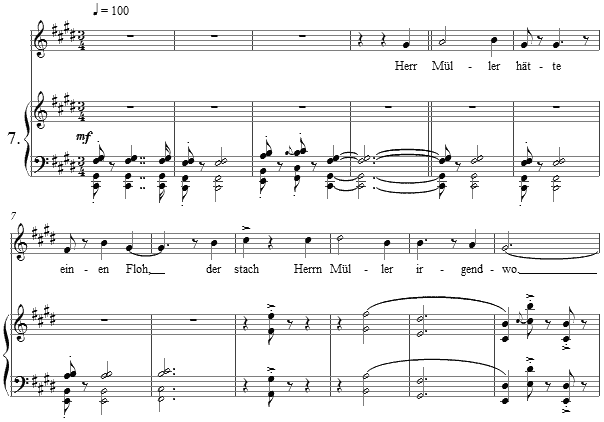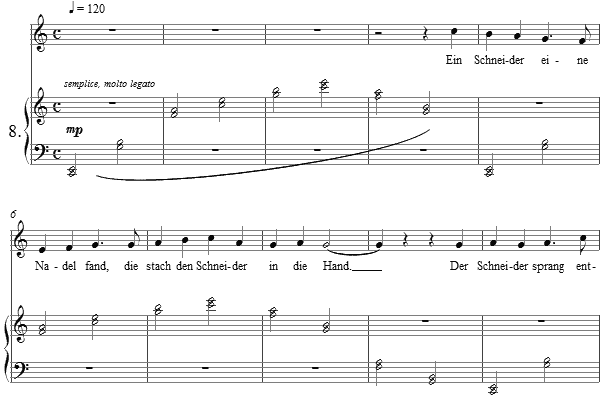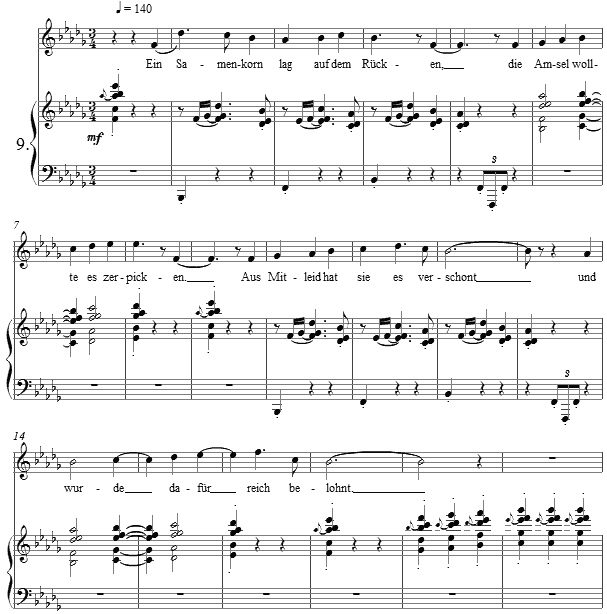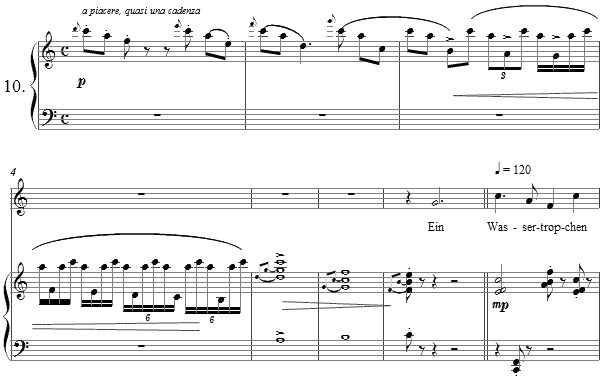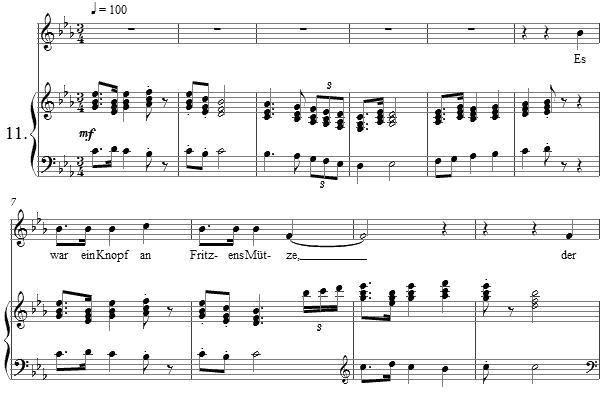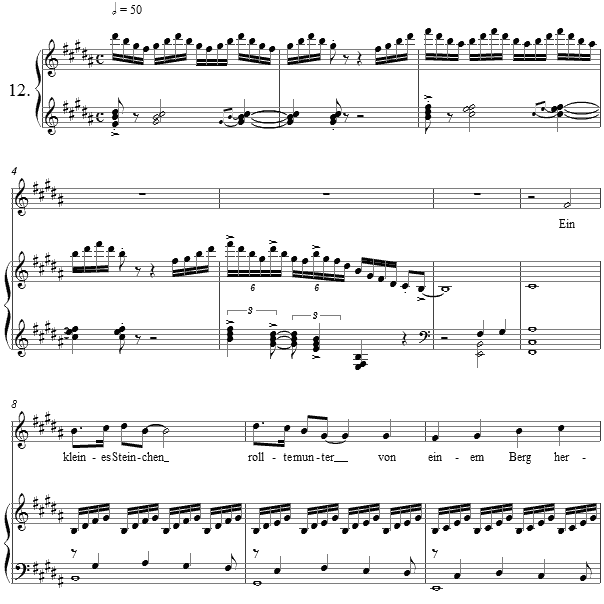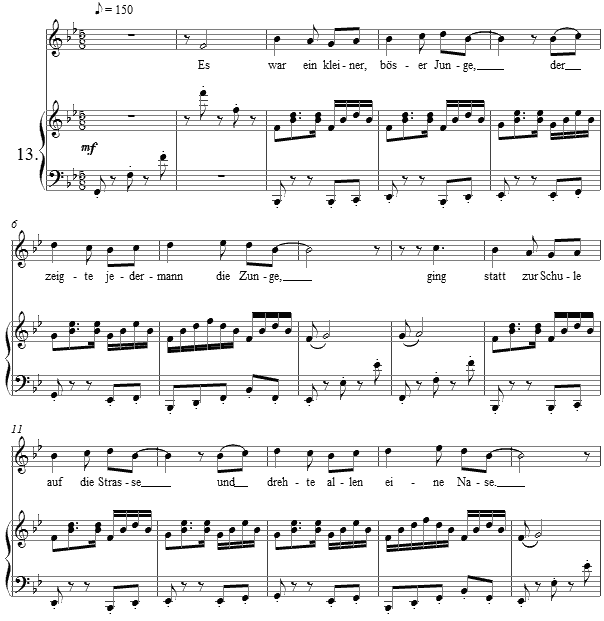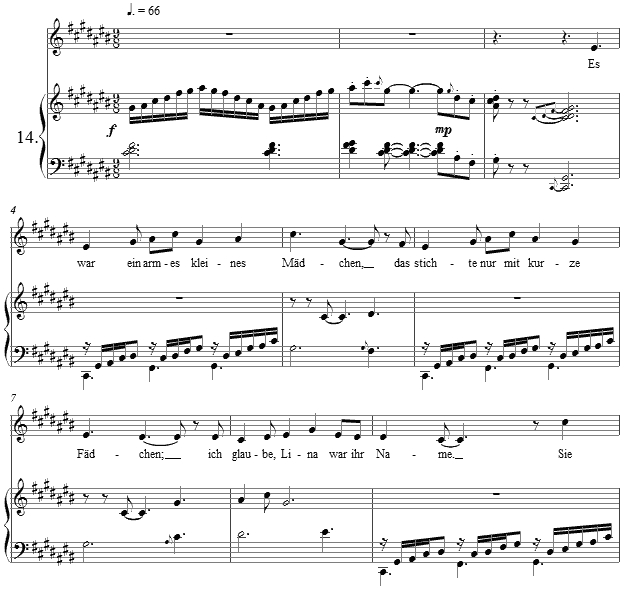Music and Texts of GARY BACHLUND
Vocal Music | Piano | Organ | Chamber Music | Orchestral | Articles and Commentary | Poems and Stories | Miscellany | FAQs
Kleine Wesen - (2008)
Joachim Ringelnatz
fourteen songs for medium voice and piano
i. Einleitung [ 1 page, circa 45" ]
Viel passiert zu allen Zeiten
In der Welt der Kleinigkeiten.
Stimmt bald ernst und stimmt bald heiter. --
So, nun blätt're, bitte, weiter.
ii. Die Feder [ 3 pages, circa 1' 45" ]
Ein Federchen flog über Land;
Ein Nilpferd schlummerte im Sand.
Die Feder sprach: "Ich will es wecken!"
Sie liebte, andere zu necken.
Aufs Nilpferd setzte sich die Feder
Und streichelte sein dickes Leder.
Das Nilpferd öffnete den Rachen
Und mußte ungeheuer lachen.
iii. Der Funke [ 2 pages, circa 55" ]
Es war einmal ein kleiner Funke.
Das war ein großer Erzhallunke.
Er sprang vom Herd und wie zum Spaß
Gerade in ein Pulverfaß.
Das Pulverfaß, das knallte sehr;
Da kam so fort die Feuerwehr
Und spritzte dann mit Müh und Not
Das Feuer und das Fünkchen tot.
iv. Der Edelstein [ 3 pages, circa 2' 30" ]
Der gute König Magarone
Trug einen Stein in seiner Krone.
Es war ein schöner Edelstein,
Er funkelte wie Sonnenschein.
Ein böser König kam aus Polen,
Um sich den Edelstein zu holen.
Sie stritten sich fast zehn Minuten,
Der böse König mit dem guten.
Dann kam ein fürchterlicher Krieg.
Der gute König kam zum Sieg.
Und schenkte -- weil er sich so freute --
Den Edelstein an arme Leute.
v. Die Seifenblase [ 3 pages, circa 1' 50" ]
Es schwebte eine Seifenblase
Aus einem Fenster auf die Straße.
"Ach, nimm mich mit Dir," bat die Spinne
Und sprang von einer Regenrinne.
Und weil die Spinne gar nicht schwer,
Fuhr sie im Luftschiff übers Meer.
Da nahte eine böse Mücke,
Sie stach ins Luftschiff voller Tücke.
Die Spinne mit dem Luftschiff sank
Ins kalte Wasser und ertrank.
vi. Das Ei [ 1 page, circa 35" ]
Es fiel einmal ein Kuckucksei
Vom Baum herab und ging entzwei.
Im Ei da war ein Krokodil;
Am ersten Tag war's im April.
vii. Der Floh [ 3 pages, circa 2' 05" ]
Herr Müller hatte einen Floh,
Der stach Herrn Müller irgendwo.
Herr Müller dankte für die Ehre,
Dann nahm er seine lange Schere
Und schnitt ihn in zwei gleiche Teile.
Jedoch, nach einer kurzen Weile,
Da wurden aus dem einen Floh
Zwei neue Flöh' daraus. -- Oho!
Da sprach der eine von den beiden:
"Man muß nicht einen Floh zerschneiden."
viii. Die Nadel [ 2 pages, circa 1' 25" ]
Ein Schneider eine Nadel fand,
Die stach den Schneider in die Hand.
Der Schneider sprang entsetzt zurück,
Die Nadel sprach, ich bring' dir Glück.
Der König hörte Schneiders Leid,
Und er bestellte sich ein Kleid.
Der Schneider nähte dieses gleich;
Am andern tage war er reich.
So hat die Nadel über Nacht
Dem armen Schneider Glück gebracht.
ix. Das Samenkorn [ 2 pages, circa 1' 00" ]
Ein Samenkorn lag auf dem Rücken,
Die Amsel wollte es zerpicken.
Aus Mitleid hat sie es verschont
Und wurde dafür reich belohnt.
Das Korn, das auf der Erde lag,
Das wuchs und wuchs von Tag zu Tag.
Jetzt ist es schon ein hoher Baum
Und trägt ein Nest aus weichem Flaum.
Die Amsel hat das Nest erbaut;
Dort sitzt sie nun und zwitschert laut.
x. Der Wassertropfen [ 3 pages, circa 1' 45" ]
Ein Wassertropfen fiel vom Himmel;
Es war ein ungezog'ner Lümmel.
Im Grase schlief ein dummer Hase,
Der Tropfen fiel auf seine Nase.
Der Hase dachte sich dabei,
Daß er jetzt totgeschossen sei.
Er sprang in seinem großen Schreck
Aus seinem sicheren Versteck.
Der Jägersmann stand an der Straße
Und schoß ihn wirklich in die Nase.
xi. Der Knopf [ 3 pages, circa 1' 30" ]
Es war ein Knopf an Fritzens Mütze,
Der machte ungezogne Witze.
Erst strampelte er stundenlang,
Worauf er von der Mütze sprang.
Es fiel auf einen Kieselstein,
Dort schlief er ganz ermüdet ein.
Und eine Schlange sah den Schläfer;
Sie dachte sich, es sei ein Käfer.
Und weil der Käfer ihr gefiel
So fraß sie ihn mit Stumpf und Stiel.
xii. Der Stein [ 3 pages, circa 1' 30" ]
Ein kleines Steinchen rollte munter
Von einem hohen Berg herunter.
Und als es durch den Schnee so rollte,
Ward es viel größer als es wollte.
Da sprach der Stein mit stolzer Miene:
"Jetzt bin ich eine Schneelawine."
Er riß im Rollen noch ein Haus
Und sieben große Bäume aus.
Dann rollte er in Meer hinein,
Und dort versank der kleine Stein.
xiii. Der kleine Junge [ 2 pages, circa 1' 20" ]
Es war ein kleiner, böser Junge
Der zeigte jedermann die Zunge,
Ging statt zur Schule auf die Straße
Und drehte allen eine Nase.
Als seine Eltern beide tot,
Kam er in bitterliche Not.
Und lebt nun -- weil er sonst nichts kann --
Als armer Leierkastenmann.
xiv. Das kleine Mädchen [ 3 pages, circa 1' 40" ]
Es war ein armes kleines Mädchen,
Das strickte nur mit kurzen Fädchen;
Ich glaube, Lina war ihr Name.
Sie wurde eine schöne Dame,
War fleißig, brav und lernte gerne,
Da kam ein Prinz aus weiter Ferne.
Der sagte: "Liebe gute Lina,
Komm mit mir auf mein Schloß nach China."
Dort sitzen sie nun alle beide
Auf einem Thron von gelber Seide.[ 36 pages with cover and contents, circa 20 ' 35 " ]
Joachim Ringelnatz
The rhymed interpretations below are not wholly literal translations, for a literal translation could spoil some of the humor. Rather I endeavored to capture the flavor of these "little creatures" from the inventive mind of Joachim Ringelnatz. For more information on the poet, please see the page about my settings of his Strumpfsinn Lieder.
Little Creatures
i. Introduction
Much occurs at various times
In this world of tiny rhymes.
It could be serious, or comic too,
So please then, friend, continue.
As a simple introduction to the cycle, this short four line poem is mirrored with four rocking, arched phrases based on open-position seven chords.
ii. The Feather
A little feather flew over the land;
A hippopotamus slept beneath on sand.
The feather said, "I will disturb it!"
It thought quite so to perturb it.
So the feather played the clown
And tickled with its tickly down.
The hippo opened wide its jaw
And let out a huge guffaw.
A play between the higher and lower ranges of the piano underscore the feather "above" and the hippopotamus "beneath." A light syncopation between piano and voice at the end of the setting lightly characterize the laughter.
iii. The Spark
A little spark would soon surprise
Quite with its destruction's cries.
It sprang from stove to its own peril
And landed in a powder barrel.
The powder, black, exploded then
And this brought out the firemen
Who watered down this emergency
So that fire and spark lost their urgency.
This rushing 6/8 with the minor-major seven chords brings a sense of urgency to the tale. The triple feel of the hemiola which breaks the duple rhythm punctuates the phrases.
iv. The Gemstone
Good king Magarone placed a fine gem
In middle of his regal diadem.
A rarest gemstone quite so fine,
It glistened like the sun's bright shine.
An evil king came out from Poland
To take that gemstone to his lowland.
They argued much for minutes ten,
As argumentative regal men.
Then there came an awful war
But Magarone won, and thereby swore
To charity the stone be given,
For his people had with him striven.
Magarone was apparently the name of a close friend from Ringelnatz's time in the war. This little mention of him is sweet, casting him as the "good king," and surely he triumphs in the end. The broadly spaced, double dotted gestures picture a regal bearing.
v. The Soap Bubble
A soap bubble hovered as it flew
Towards a window's street-side view.
"Oh, take me away," a spider cried out,
While springing from his gutter spout.
And as the spider's weight was light,
They flew on towards the sea that night.
But then there came a nasty midge,
The soap bubble to hemorrhage.
The ship of spider and of bubble
Sank into a sea of trouble.
The uplift of the top voice suggests the bounce of a light soap bubble caught on currents of air. The spider's answer mimics this, and the final fall into the sea is a set of these gestures falling rapidly and diatonically.
vi. The Egg
A cuckoo's egg dropped from a tree
And broke apart due to gravity.
Inwards was found a crocodile,
An April Fool's surprise reptile.
This short setting of one page mimics the romantic period's accompaniment texture, while being more static and repetitive akin to the minimalist urge of this time. The slight twist in accompaniment's harmony comes only when we learn of the crocodile.
vii. The Flea
Mister Miller had a flea,
That bit him somewhere inwardly.
Mister Miller was quite impressed,
And fetched some scissors for this pest
That it might soon be cut in two.
But soon from flea-parts' residue
What seemed just one now became two
Who took the place of the flea he slew.
Then said one flea unto his friend:
"Snipping fleas in two is not the end."
The sharp, jerky accompaniment suggests a certain discomfort, for certainly a flea bite is such. Then again being snipped in half is a discomfort of a larger order, and the visit by yet more fleas another.
viii. The Sewing Pin
A tailor's hand found a sewing pin
which found its pointed way through skin.
The tailor was thereby full dumbstruck
As the needle said loud, "I'll bring you luck."
The king heard of this good luck tale
And bought up his many clothes for sale.
The tailor stitched with all his might
And earned much profit which was right.
So did a sewing pin instantaneously
Make for luck most curiously.
The sparse accompaniment is a change from the various previous settings, as the harmonic palette is spread across several octaves. The opening phrase is followed by its own palindrome, and the accompaniment becomes more complex as the setting progresses, towards this happy ending.
ix. The Seed
A bit of seed was lying around
When a blackbird espied it on the ground.
"While I could dine upon this feast,
I'll pity take on this seed, at least."
Because the blackbird left it lie,
The seed had time to grow quite high.
And now it is a great large tree
With nests snuggled high quite blissfully.
That blackbird built its nest above,
And sang quite loud of nesting love.
The setting rises from the darker B flat minor to D flat major as the tale brings this small story to yet another happy ending with the bird chirping from its musical nest.
x. The Water Drop
A water drop fell from the skies,
A trickster, I should emphasize.
In the grass did a stupid rabbit doze,
As the drop dropped down upon its nose.
The rabbit woke up on the spot
And surely thought it had been shot.
It leapt up from its resting place,
And thereby showed its rabbit's face.
A hunter took aim, the story goes,
And shot that rabbit in its nose.
A cadenza-like opening gesture begins the shower of notes. As the unhappy tale of the "dumb" rabbit is told, one might think it a happy tale for both the "trickster" water drop as for the hunter who bags another another kill. In the end, it is a rainy day.
xi. The Button
There was a button on Fritz' cap,
a cheeky, jocular, knobby chap.
At first it struggled hours long
To break the threads which held it strong.
But when it finally fell, it found a little stone
And there it slept, button tired and prone.
A snake came upon the sleeper,
For tasty beetles lure on this creeper.
Thinking it was some crunchy bug
It ate that button with a happy shrug.
A lightly regal harmonic gesture at the opening imagines the Fritz to be none other than Germany beloved "Alte Fritz." The snake comes in from the lower range of piano in musical twists and turns.
xii. The Stone
A little stone rolled down snappily
From a mountain's summit happily.
And as it rolled upon the snow,
The snowy stone did seem to grow.
And as it grew, it cried with glee:
"I am an avalanche of pebble ancestry."
It tore away a family house
And seven trees, this stony louse.
But then it rolled into the sea,
One tiny stone sinking, worthlessly.
A rollicking, rolling gesture opens to picture the stone coming loose in its first drop the mountain top to the sea. The tale is told directly and the gestures drop with the perceived "altitude."
xiii. The Little Lad
There was a nasty, little lad
Who stuck his tongue out, which was bad.
On his way to go to school
He did those things both rude and cruel.
And as an orphan, he thought he would
Get away with what he could.
But for this -- for he learned the worst --
To be a poor organ grinder he was cursed.
A limping "6/8" is this 5/8 signature, as the end for the little lad is to pump a barrel organ, perhaps most inexpertly.
xiv. The Little Lass
There was a poor but lovely little lass
Of the poorer, lower working class;
Her name was Lina, I believe,
And we should not for her story grieve.
She was hard working, true and versed,
And through a Chinese prince her life reversed.
He said, "Lina, you are worthy fair,
Come be my bride beyond all compare."
And now they're bound by loving tether
On a throne of yellow silk together.
Pentatonic colors paint this portrait of the "lovely little lass" who becomes a princess to some Chinese prince. The rolling 9/8 gestures from tonic to subdominant to dominant are broken by small interludes of odd, pentatonic fabric while the vocal line breaks the regularity of the triple meter with other rhythms which overlie it.
English texts - Copyright 2008 Gary Bachlund All international rights reserved.
The score for Kleine Wesen is available as a free PDF download, though any major commercial performance or recording of the work is prohibited without prior arrangement with the composer. Click on the graphic below for this piano-vocal score.

